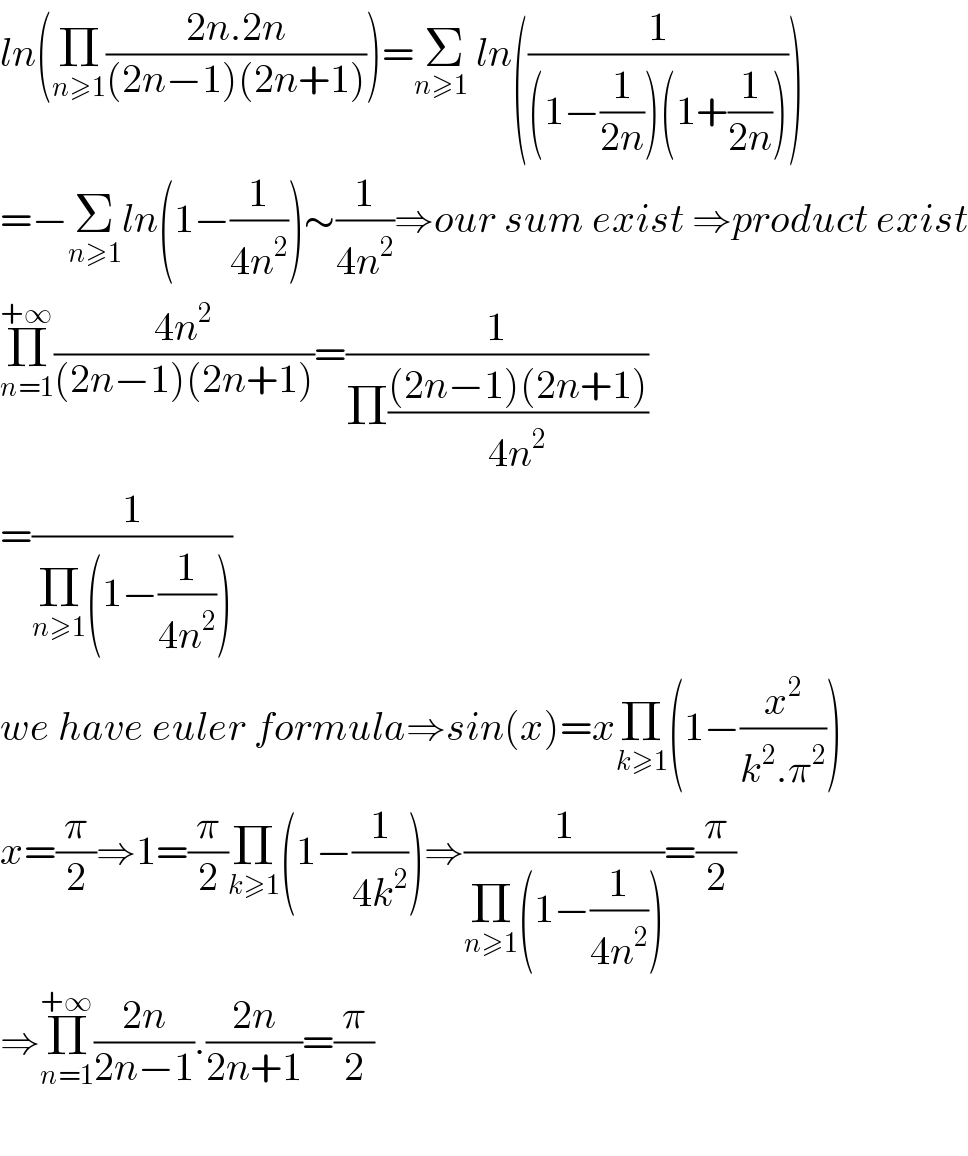Question Number 80792 by john santu last updated on 06/Feb/20
![Π_(n=1) ^∞ [((2n)/(2n−1)).((2n)/(2n+1))] =?](https://www.tinkutara.com/question/Q80792.png)
$$\underset{{n}=\mathrm{1}} {\overset{\infty} {\prod}}\left[\frac{\mathrm{2}{n}}{\mathrm{2}{n}−\mathrm{1}}.\frac{\mathrm{2}{n}}{\mathrm{2}{n}+\mathrm{1}}\right]\:=? \\ $$
Answered by mind is power last updated on 06/Feb/20

$${ln}\left(\underset{{n}\geqslant\mathrm{1}} {\prod}\frac{\mathrm{2}{n}.\mathrm{2}{n}}{\left(\mathrm{2}{n}−\mathrm{1}\right)\left(\mathrm{2}{n}+\mathrm{1}\right)}\right)=\underset{{n}\geqslant\mathrm{1}_{} } {\sum}{ln}\left(\frac{\mathrm{1}}{\left(\mathrm{1}−\frac{\mathrm{1}}{\mathrm{2}{n}}\right)\left(\mathrm{1}+\frac{\mathrm{1}}{\mathrm{2}{n}}\right)}\right) \\ $$$$=−\underset{{n}\geqslant\mathrm{1}} {\sum}{ln}\left(\mathrm{1}−\frac{\mathrm{1}}{\mathrm{4}{n}^{\mathrm{2}} }\right)\sim\frac{\mathrm{1}}{\mathrm{4}{n}^{\mathrm{2}} }\Rightarrow{our}\:{sum}\:{exist}\:\Rightarrow{product}\:{exist} \\ $$$$\underset{{n}=\mathrm{1}} {\overset{+\infty} {\prod}}\frac{\mathrm{4}{n}^{\mathrm{2}} }{\left(\mathrm{2}{n}−\mathrm{1}\right)\left(\mathrm{2}{n}+\mathrm{1}\right)}=\frac{\mathrm{1}}{\Pi\frac{\left(\mathrm{2}{n}−\mathrm{1}\right)\left(\mathrm{2}{n}+\mathrm{1}\right)}{\mathrm{4}{n}^{\mathrm{2}} }} \\ $$$$=\frac{\mathrm{1}}{\underset{{n}\geqslant\mathrm{1}} {\prod}\left(\mathrm{1}−\frac{\mathrm{1}}{\mathrm{4}{n}^{\mathrm{2}} }\right)} \\ $$$${we}\:{have}\:{euler}\:{formula}\Rightarrow{sin}\left({x}\right)={x}\underset{{k}\geqslant\mathrm{1}} {\prod}\left(\mathrm{1}−\frac{{x}^{\mathrm{2}} }{{k}^{\mathrm{2}} .\pi^{\mathrm{2}} }\right) \\ $$$${x}=\frac{\pi}{\mathrm{2}}\Rightarrow\mathrm{1}=\frac{\pi}{\mathrm{2}}\underset{{k}\geqslant\mathrm{1}} {\prod}\left(\mathrm{1}−\frac{\mathrm{1}}{\mathrm{4}{k}^{\mathrm{2}} }\right)\Rightarrow\frac{\mathrm{1}}{\underset{{n}\geqslant\mathrm{1}} {\prod}\left(\mathrm{1}−\frac{\mathrm{1}}{\mathrm{4}{n}^{\mathrm{2}} }\right)}=\frac{\pi}{\mathrm{2}} \\ $$$$\Rightarrow\underset{{n}=\mathrm{1}} {\overset{+\infty} {\prod}}\frac{\mathrm{2}{n}}{\mathrm{2}{n}−\mathrm{1}}.\frac{\mathrm{2}{n}}{\mathrm{2}{n}+\mathrm{1}}=\frac{\pi}{\mathrm{2}} \\ $$$$ \\ $$
Commented by jagoll last updated on 07/Feb/20

$${thank}\:{you}\:{sir} \\ $$
